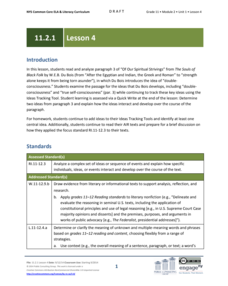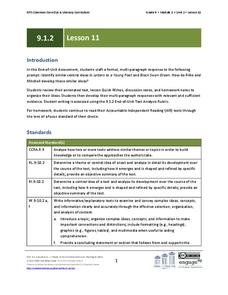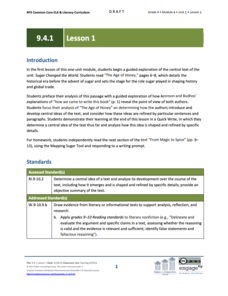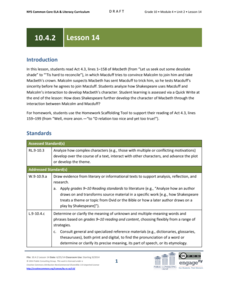Curated OER
Two Greedy Bears
Improving listening comprehension skills is the goal of this language arts instructional activity. Young readers listen to the story Two Greedy Bears, stopping to have discussions with a partner. They predict outcomes and make inferences...
Curated OER
Juan Verdades
Cement comprehension skills using the strategies in this activity. After reading the story, Juan Verdades by Joe Hays, learners use context clues to answer questions, identify main ideas and details, and sequence events.
Curated OER
Knights of the Round Table adapted by Gwen Ross
Everyone loves the tales involving King Arthur and his knights. After reading Knights of the Round Table by Gwen Gross, learners draw inferences and conclusions, analyze story elements, and discuss figurative language, including...
Curated OER
Using Details from the Text
Explore non-fiction comprehension strategies with your class. They will visualize daily activities and label a 4 circle Venn diagram with related phrases. They must identify the overlapping sections as "main ideas," then complete a...
Curated OER
Newspaper Unit: Reading Lesson Plan
Work on identifying the different parts of a newspaper with your English learners. After reviewing newspaper terminology, pupils pair up and complete a scavenger hunt, looking for specific things in the newspaper and recording their...
Curated OER
Mythological Word Origins
No wonder the ship was called the Titanic. An investigation of Norse, Roman, and Greek Mythology provides insight into mythological characters and corresponding words in the English language. A close look at roots, prefixes, and suffixes...
Curated OER
Mythological Word Origins
Review myths and the characters therein, connecting them to vocabulary words in the English language today. Begin by searching online for myths and character names. With at least ten names that are familiar English words, students use...
Perkins School for the Blind
Language Experience Stories
Here is a great way to bring core content to your special education classroom. Included is a set of instructional ideas intended to help learners increase their verbal and written expression through storytelling. Tape recorders, story...
EngageNY
Grade 11 ELA Module 2: Unit 1, Lesson 9
Change for the better. Scholars continue their study of the chapter "Of Our Spiritual Strivings" by looking at paragraph eight. They study how Du Bois continues to develop his ideas by describing the changes after the passing of the...
EngageNY
Grade 11 ELA Module 2: Unit 1, Lesson 4
What exactly is consciousness? Readers look at paragraph three of the chapter "Of Our Spiritual Strivings" and discuss how Du Bois introduces the ideas of double consciousness and true self-consciousness. Scholars track the development...
EngageNY
Grade 11 ELA Module 2: Unit 1, Lesson 14
Leave the past in the past. Scholars read paragraph 12 of the chapter "Of Our Spiritual Strivings" to analyze Du Bois's development of gaining liberty and leaving the ideas of the past. Pupils then carry out a three to five-minute...
EngageNY
Grade 9 ELA Module 1, Unit 1, Lesson 7
A story about feral girls raised by werewolves will have some interesting character development! Track how the girls and their teachers act, speak, and change with a lesson focused on Karen Russell's "St. Lucy's Home for Girls Raised by...
EngageNY
Grade 10 ELA Module 1: Unit 3, Lesson 12
Relationships between characters generate energy that propels the plot and connects events with a central idea. Track character development and meaningful relationships with a literary analysis instructional activity focused on H.G....
EngageNY
Grade 10 ELA Module 1: Unit 3, Lesson 14
A thorough unit on literary analysis and character development culminates in a final writing assessment. Prompted to compare the parent-child relationships in Amy Tan's The Joy Luck Club and H.G. Bissinger's Friday Night Lights, high...
EngageNY
Grade 9 ELA Module 1, Unit 2, Lesson 11
As an end-of-unit assessment, class members craft a formal, multi-paragraph essay identifying a similar idea found in Rainer Maria Rilke's collection, Letters to a Young Poet, and David Mitchell's Black Swan Green. Writers state and use...
EngageNY
Grade 9 ELA Module 2, Unit 3, Lesson 12
As the first in a two-part, end-of-unit assessment that encourages readers to synthesize the unit's main ideas, class members review their notes for each of the three texts they read and develop three open-ended discussion questions...
EngageNY
Grade 9 ELA Module 4, Unit 1, Lesson 1
How do writers introduce and develop the central ideas in a text? To answer this question, ninth graders closely examine "The Age of Honey," the opening chapter in Marc Aronson and Marina Budhos' Sugar Changed the World: A Story of...
EngageNY
Grade 9 ELA Module 4, Unit 1, Lesson 3
What is the connection between the spread of ideas and the expansion of the sugar trade? Class members continue their reading of Sugar Changed the World and use an analysis tool to identify how critical ideas in the chapters are...
EngageNY
Grade 10 ELA Module 4: Unit 1, Lesson 6
It's time to tie it all together. Scholars reflect on the series' past five lessons about Death of the Pig. They examine how E.B. White develops a central idea throughout the essay before responding to a writing prompt.
EngageNY
Grade 11 ELA Module 1: Unit 2, Lesson 14
How do Ophelia's interactions with Hamlet help develop her character? Pupils continue reading Act 3.1 from Shakespeare's Hamlet. Using writing and discussion, scholars analyze the dialogue between Hamlet and Ophelia, paying particular...
EngageNY
Grade 11 ELA Module 2: Unit 1, Lesson 7
Give the class some clarification. Scholars determine how Du Bois develops his central ideas in the chapter "Of Our Spiritual Strivings" by refining and clarifying his ideas. They organize their thoughts by annotating and recording the...
EngageNY
Grade 10 ELA Module 4: Unit 2, Lesson 14
How does Shakespeare further develop Macbeth's character using the interaction between Macduff and Malcolm? Pupils write responses to the question. They continue their analysis of Macbeth with a masterful reading and guided whole-class...
BBC
The Sound Monster - Words That Make Sounds
There are words in the English language that actually make sounds, such as vroom, and, buzz. Here is a clever lesson which introduces young readers to these sound-making words. They play an interactive game on the computer that has them...
Curated OER
Differentiated Language Arts
Pupils read speeches and identify the main idea as well as the literary techniques employed, paying careful attention to the persuasion and repetition elements that each speech possesses. Using a graphic organizer, they analyze,...

























